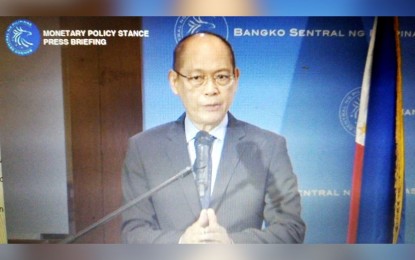
BSP Governor Benjamin Diokno
MANILA – Philippine monetary officials on Thursday announced an unexpected 50-basis-point reduction on the Bangko Sentral ng Pilipinas’ (BSP) key policy rates after citing the need to support the pandemic-hit domestic economy.
The rate cut brought the central bank’s overnight reverse repurchase (RRP) rate to a record-low 2.25 percent, the overnight deposit rate to 1.75 percent, and the overnight lending rate to 2.75 percent effective June 26.
To date, BSP’s policy-making Monetary Board (MB) has reduced the central bank’s key rate by a total of 175 basis points, 150 basis points of which were made after the government placed Metro Manila, among other areas, under community quarantine to address the rise in coronavirus disease 2019 (Covid-19) infections since mid-March.
Aside from this week’s rate cut, the other 50-basis-point slashes in the BSP rates were decided upon by the Board last March 19 and April 16. A 25-basis-point reduction was made last February.
In a virtual briefing, BSP Governor Benjamin Diokno said they continue to see within-target inflation rate for this year and next year but there is a need to boost domestic activity given the impact of the pandemic, thus, the rate cut.
This, after domestic growth, as measured by the gross domestic product (GDP), in the first quarter of the year contracted by 0.2 percent, the first negative output since the last quarter of 1998, on account of the enhanced community quarantine (ECQ) declared over mainland Luzon from March 17 until May 15 and extended until end of May for Metro Manila.
The quarantine limited people’s movement in Luzon, which accounts for about 70 percent of the national GDP, resulting in an economic contraction in the first quarter of the year even as the ECQ affected only the last two weeks of March.
Aside from domestic developments, Diokno said the global growth outlook is also bleak because of the health crisis.
He said the MB noted that “even as economies begin to reopen, the global recovery would likely be protracted and uneven.”
“Hence, there remains a critical need for continuing measures to bolster economic activity and support financial conditions, especially the effective implementation of interventions to protect human health, boost agricultural productivity, and build infrastructure,” Diokno said.
Given these considerations, he said, the MB decided that a further reduction in the policy rate, amid a benign inflation environment, would help mitigate the downside risks to growth and boost market confidence.
“Even as domestic liquidity dynamics and market function continue to improve owing to prior liquidity-enhancing measures, the Monetary Board believes that keeping an accommodative stance will further ease the cost of borrowing and ensure ample credit and liquidity in the financial system as the economy transitions toward recovery in the coming months,” Diokno said.
He noted that the BSP reiterated its support for the health and fiscal programs already being rolled out by the national government in responding to the needs of Filipino households and businesses.
“The BSP remains committed to deploying its full range of monetary instruments and regulatory relief measures as needed in fulfillment of its mandate to promote non-inflationary and sustainable growth,” Diokno added.
During the same briefing, BSP Deputy Governor Francisco Dakila Jr. said the Board hiked the central bank’s average inflation forecast for this and next year on account of higher global oil prices.
From the 2.2-percent average inflation rate forecast last April, the BSP’s latest projection for this year is higher at 2.3 percent.
For next year, the forecast is now at 2.6 percent from 2.5 percent previously.
Dakila said an increase in global oil prices is the “make factor” for the revision in the projection “but this was partly offset by the weaker economic growth, both domestically and globally, as well as the continued stability of the peso.”
Meanwhile, he said the liquidity released as a result of the policy rate cuts, which is aimed at encouraging banks to lend more to their clients to support domestic economic activity, has been going back to the central bank.
“This is understandable given the heightened level of uncertainty that prevails in the economy,” Dakila said, citing a lag on the impact of the rate cut on the domestic economy.
In terms of the rate cut’s impact on boosting domestic expansion, he said this depends on “the speed at which we recover our confidence, especially consumer confidence.”
“Lowering of interest rates will help in encouraging consumers to spend and businesses to begin to, at least, start their production activities again,” Dakila added.
Aside from the rate cuts, the BSP has also helped the national government’s Covid-19 response by extending a PHP300-billion repurchase agreement to buy government securities.
He said the BSP, under its Charter, is authorized to lend to the national government but the amount is limited to 20 percent of its average annual income in the past three years.
“Given this ceiling, the most that we could provide in terms of provisional advances would be around PHP550 billion,” Dakila said, adding that the BSP has not received another request from the Bureau of the Treasury for an additional amount. (PNA)
